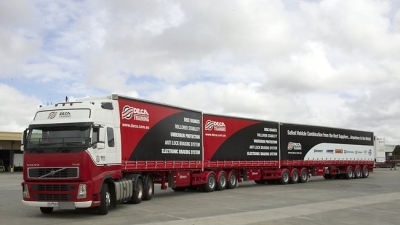
The 2013 Budget has failed Australia’s trucking businesses because it does not reverse the government’s plan to extend the carbon tax to the trucking industry, Australian Trucking Association chief executive Stuart St Clair said.
The fuel used by trucking businesses is currently exempt from the carbon tax. The government plans to extend the tax to the industry from 1 July 2014, which would increase the industry’s effective fuel tax by almost seven cents per litre: a 27 per cent tax hike.
The plan would cost the industry $510 million in 2014-15.
Mr St Clair said the government’s plan would have a devastating effect on many small trucking businesses.
“More than 70 per cent of trucking businesses have only one truck. They don’t have the market power to pass the tax onto their customers, they run on very tight margins, and they generally don’t have the option of switching to renewable fuels,” Mr St Clair said.
He said the projected collapse in the carbon price in 2015-16 should have been a wakeup call for the government.
“The carbon price will be set by the market from 1 July 2015. The Budget papers forecast it will collapse to $12.10 per tonne as a result of the low European carbon price. That converts to 3.267 cents per litre of diesel.
“So the government’s plan would subject trucking operators to a devastating tax spike in 2014-15. This would be followed by a carbon price still exceeding three cents per litre in 2015-16, and then uncertainty in future years. It would be managed through a pricing mechanism that would give operators only three week’s notice of each price change.
“Instead of imposing savage austerity and wild tax swings on Australia’s trucking businesses, the government should have made the choice to announce it would not extend the carbon tax to trucking.
“It should have focused on charting a pathway to reduced greenhouse gas emissions, higher productivity and better safety by pressing on with enabling the industry to use more productive vehicles that use less fuel to do the same job.
“Let’s say you need to move a thousand tonnes of freight. You could move this freight with a fleet of 77 three axle rigid trucks – or you could use just 20 B-triples, which consist of a prime mover and three trailers linked by turntables.
“Using the B-triples would reduce your greenhouse gas emissions by 37 per cent and improve safety, because you would need fewer trucks to do the job.
“The government’s next Nation Building Program, announced this evening, supports this aim. It will build better, safer roads and includes more funding for truck rest areas and productivity measures.
“As it stands, though, this valuable funding will not help the trucking businesses that have to leave the industry because of the carbon tax,” Mr St Clair said. (106)





